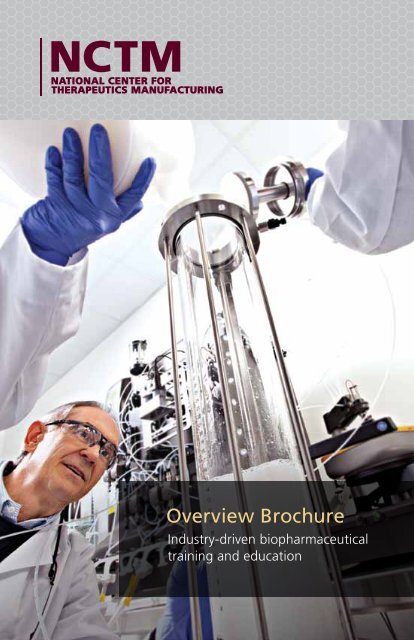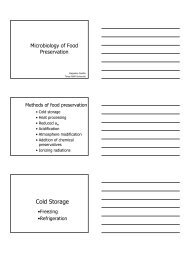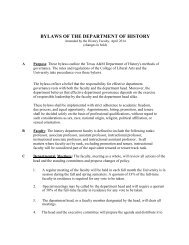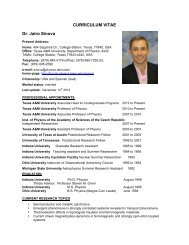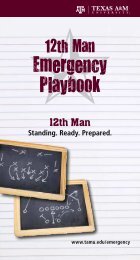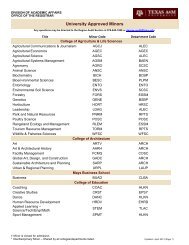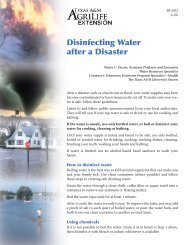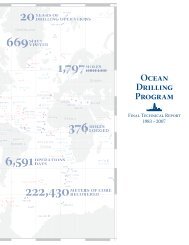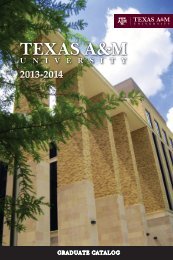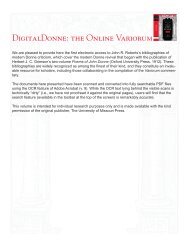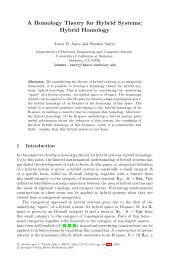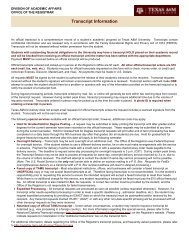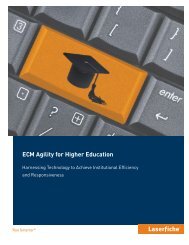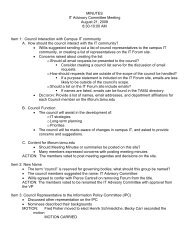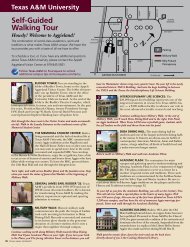Course Catalog - National Center for Therapeutic Manufacturing ...
Course Catalog - National Center for Therapeutic Manufacturing ...
Course Catalog - National Center for Therapeutic Manufacturing ...
- No tags were found...
Create successful ePaper yourself
Turn your PDF publications into a flip-book with our unique Google optimized e-Paper software.
Overview BrochureIndustry-driven biopharmaceuticaltraining and education
about3About NCTMThe <strong>National</strong> <strong>Center</strong> <strong>for</strong> <strong>Therapeutic</strong>s <strong>Manufacturing</strong>(NCTM) is a first-of-its-kind, interdisciplinary work<strong>for</strong>ceeducation institution and biopharmaceutical manufacturingcenter, located at Texas A&M University in College Station,Texas. The NCTM’s work<strong>for</strong>ce development mission is toprovide education, training, and outreach programs toproduce a highly skilled work<strong>for</strong>ce <strong>for</strong> the vital US andglobal pharmaceutical industry.NCTM Programs>> Academic Degrees>> Technical Certificate Programs>> Professional Development>> Continuing Education>> Distance/Blended Learning>> Educator Workshops>> STEM Summer Academies>> Industry Internships
FacilitiesThe NCTM offers 152,000 square feet of work<strong>for</strong>ce development andcontract biomanufacturing space. The training wing provides nearly50,000 square feet of educational facilities with well-appointedwet labs, cell culture facility, spacious lecture and conferencehalls, simulation laboratory, and fully-equipped current Good<strong>Manufacturing</strong> Practice (cGMP) suite that simulates pharmaceuticalmanufacturing environments.AccommodationsGMP Training Suite:equipped with modern upstreamand downstream bioprocessequipment to simulate commercialpharmaceutical manufacturingenvironmentsCell Culture & TechLaboratory: outfitted to teachprocess development, optimization,and scale-up of differentcell culturesAnalytical InstructionalLaboratory: demonstratesin-process testing usingmodern analytical technologyand techniques48-Workstation Wet Lab:equipped to teach a varietyof scientific classesTwo Spacious Lecture/Conference Halls: interactivedistance learning environmentsserving 75 and 125Simulation SoftwareTraining Laboratory:48 SMART technology computersequipped with modeling andoptimization software used inthe biopharmacutical industry
courses13Documentation in cGMP environmentsCurriculum discusses the variety of documentation practices andprotocols in current Good <strong>Manufacturing</strong> Practices (cGMP) environments.Topics include principles of data and in<strong>for</strong>mation entry, basicsof technical writing, and process documentation, including laboratorynotebooks, logbooks, and batch production records (BPRs). Controlof these documents, deviation reports, production and process controls,laboratory controls, and calibration programs and documentationare also included. An overview of the entire documentation pathwayfrom R&D to commercialization of product, including corporate, R&D,manufacturing and quality documents is provided.Pharmaceutical Facility OperationsParticipants receive a comprehensive overview of the variety ofbiologics, drug, and device manufacturing facilities, including design/layout, utilities, and equipment. Students learn about principles ofaseptic techniques, sterilization, and environmental monitoring, aswell as hazards, risk mitigation, and their relation to worker andenvironmental safety. The importance of equipment maintenanceand calibration are also taught along with data analysis principles andreport generation as they relate to pharmaceutical facility operations.Safety in the Pharmaceutical IndustryThis course covers a wide range of safety, health and environmental(SHE) issues specifically related to the pharmaceutical manufacturingindustry. Topics include BSL 1-3, risk assessment/analysis, toxicology,and industrial hygiene. Students learn about process and productsafety and investigate case histories, historically significant accidents,and lessons learned.Corrective & Preventative Actions (CAPA)Attendees are introduced to failure recognition, deviations, root causeanalysis, corrective actions, and other elements of risk mitigation. Thecourse explains the regulatory environment surrounding CAPA, how aCorrective and Preventative Actions (CAPA) system works, the basicsof an investigation, and how an investigation is per<strong>for</strong>med.
14 coursesProcess Control & OptimizationRisk-Based Biotherapeutics Production & DeliveryPresents the concept of Lean Thinking and how lean methodologiesare trans<strong>for</strong>ming American manufacturing. Students discuss topicssuch as facilities and workstation layout and design, ergonomics,waste reduction, process flow and queuing network analysis, as wellas “push vs. pull” and “just in time” systems. Emphasis is placed onprinciples and applications of Lean Thinking and the influence ofvariance on optimal systems behavior.Designing <strong>for</strong> FlexibilityDetails the systematic methods involved in the design of flexiblepharmaceutical manufacturing facilities, such as active pharmaceuticalingredient (API) and <strong>for</strong>mulation and finishing plants. The coursediscusses special considerations <strong>for</strong> requirements of regulatory environments,building design, critical utility design, and multiproduct facilities.Students learn to develop optimization <strong>for</strong>mulations <strong>for</strong> nominaland flexible designs, manipulate designs and operation variables toenhance flexibility, synthesize flexible mass-integration and energyintegrationnetworks, and per<strong>for</strong>m team case studies and professionaldesign reports.Bioprocess Dynamics & ControlCurriculum provides an overview of bioprocess modeling and dynamics,bioprocess control, and control systems analysis and design. In additionto developing and implementing dynamic and empirical models usingsimulation techniques, students also learn to analyze and optimizeproperties of dynamic models and bioprocesses. Students participatein team case studies to address bioprocess control-related problems.Pharmaceutical Supply ChainsDiscusses biopharmaceutical industry supply chain concepts and coversthe development stage, raw material producers, equipment producers,manufacturers, distribution channels, and delivery of the medicine tothe patient. Curriculum highlights how regulatory affairs, compliance,risk management, drug properties, quality, and traceability affect thesupply chain and its players.
courses15Human Error & Resilience in Biomanufacturing SystemsExamines how human error impacts the safety and qualityof operations in biomanufacturing processes. Reason’s errorclassification model and the Skill-Rule-Knowledge behavioralmodes model highlight how breakdowns can lead to error. Theinteracting effects of environmental and human factors, such asworkload, stress, and time pressure are also discussed. Systemdesign guidelines and solutions like management strategies,operator practices and training, and other tools that can reducethe likelihood of error commission and also mitigate the negativeconsequences of error are presented.
NCTM InternshipsNCTM can arrange a variety of internship opportunities withour industry partners which allow students to link theory withpractice and gain important skills that cannot be taught in theclassroom. Students can apply their technical training to problemsin bioprocess engineering, process development, process optimization,facilities design and renovation, and transition of newtechnologies from the laboratory to a cGMP environment. Theseinternships provide students with valuable experience in biotechand pharmaceutical companies be<strong>for</strong>e entering the job market.
18 FAQFrequently Asked QuestionsWhat does “<strong>Therapeutic</strong>s <strong>Manufacturing</strong>” mean?<strong>Therapeutic</strong>s <strong>Manufacturing</strong> applies a variety of biotechnologyand pharmaceutical industry concepts to <strong>for</strong>m a solid plat<strong>for</strong>m fromwhich to improve and educate the work<strong>for</strong>ce who will manufacturepharmaceutical products used <strong>for</strong> treating, preventing, or curingdisease or injury in humans. It encompasses all stages of pharmaceuticalprocess development and manufacturing, including processscale-up and regulatory compliance.What careers are available in the<strong>Therapeutic</strong>s <strong>Manufacturing</strong> field?The <strong>Therapeutic</strong>s <strong>Manufacturing</strong> degree and certificate programsopen doors to a wide variety of career options, includingthe following:<strong>Manufacturing</strong> Engineer / <strong>Manufacturing</strong> Technician(Upstream, when therapeutic proteins are produced)Conducts specific manufacturing operations, such as cell cultureand growth, fermentation, preparation of media, and buffercomponents; assists with in-process testing.<strong>Manufacturing</strong> Engineer / <strong>Manufacturing</strong> Technician(Downstream, when therapeutic proteins are harvested)Conducts specific manufacturing operations, such as cleaning, andsterilization-in-place of equipment, column chromatography, ultrafiltration, diafiltration, protein purification operations, monitoringcontrol devices.Quality Control TechniciansPer<strong>for</strong>ms biological assays and routine analyses of raw materials,in-process intermediates, finished products, stability samples,environmental monitoring samples, process and cleaning validationsamples, and packaging materials in support of product manufactureand clinical trial production in compliance with standard operatingprocedures, written test procedures, safety, FDA, cGMP, and otherregulatory requirements.
FAQ19Environmental Health and Safety TechnicianMonitors water and air; calibrates and maintains scientific monitoringequipment and per<strong>for</strong>ms routine analysis of all environmentaland monitoring systems; processes permits.Facilities Engineer / Facilities TechnicianPer<strong>for</strong>ms daily monitoring, repair, and preventive maintenanceactivities on critical equipment such as water purification and airfiltration systems; troubleshoots, installs, evaluates, and modernizesnew and existing systems.Instrumentation/Calibration TechnicianPer<strong>for</strong>ms monitoring, repair, predictive and preventative maintenanceactivities on all production-related equipment <strong>for</strong> process andcritical activities as required to meet state and federal regulatoryrequirements. Troubleshoot, install, and upgrade new and existingsystems, which may include analytical instruments and processanalytical technologies.Process Development AssociateEvaluates, improves, and assists with scale-up manufacturingprocesses and technologies in order to improve product yieldand reduce overall costs of production.Validation SpecialistDevelops, recommends strategies, and designs studies to validateand document effectiveness of systems, equipment, methods, orprocesses. Conducts processes and qualification programs.What training/academic programs does NCTM offer?Short <strong>Course</strong>s and Professional DevelopmentNCTM delivers customizable, on-demand professional developmentshort courses, workshops, and job-specific training led by industryexperiencedinstructors. Tailor a course from hundreds of trainingmodules covering manufacturing/laboratory techniques (core unitsof operation), quality (QA/QC, QbD), process control & optimizationand beyond.
22 FAQDoes NCTM provide online distanceeducation offerings?One of the primary goals of the NCTM is to attract new studentsand trainees to the biomanufacturing field, as well as to supportthe transfer of workers from other industries. To accommodate bothfull- and part-time students, much of NCTM’s curriculum is beingmade available through flexible teaching plat<strong>for</strong>ms, includinghybrid/blended learning, “Flipping the Classroom”, and onlinetraining. Online/distance learning reduces time <strong>for</strong> training by upto 70%, saves money by eliminating travel and time away from work,allows students to learn at their own pace, and provides the abilityto reach a wider audience. Please contact us at 979.458.8505 orprograms@NCTMmail.tamu.edu <strong>for</strong> more in<strong>for</strong>mation.
Are there any technology vendor offerings?NCTM’s mock cGMP training suite provides a venue <strong>for</strong>technology vendors to offer demonstrations and/or trainingon certain equipment. Please contact us at 979.458.8505 orprograms@NCTMmail.tamu.edu <strong>for</strong> more in<strong>for</strong>mation.Does NCTM provide or host industryworkshops or seminars?NCTM serves the continuing education needs of pharmaceuticalprofessionals and educators alike by inviting experts from acrossthe drug development industry to discuss trends in discovery,<strong>for</strong>mulation,and delivery technologies; quality by design; regulatoryguidelines; risk assessment and management; and additional industrychallenges and innovations. Please contact us at 979.458.8505or programs@NCTMmail.tamu.edu <strong>for</strong> more in<strong>for</strong>mation.Contact UsFor more in<strong>for</strong>mation about our training, workshops, academicprograms or <strong>for</strong> general requests, please visit our website or contact:nctm.tamu.eduprograms@NCTMmail.tamu.edu | 979.458.8505 | (f) 979.847.5857
nctm.tamu.eduprograms@NCTMmail.tamu.edu | 979.458.8505 | (f) 979.847.5857100 Discovery DriveCollege Station, TX 77843


